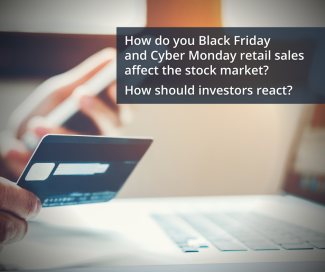
How do Black Friday and Cyber Monday retail sales affect the stock market? How should investors react?
What Typical Investors Need to Know
We all read and hear about various special deals, “doorbusters,” price cuts, and early opening hours on Black Friday. We also read and hear about the Cyber Monday deals. These sales days offer retailers a big chance to increase profits. Afterward, we see discussions of the retail sales results and the long lines of customers. How much do these sales figures really matter?
Black Friday and Cyber Monday
“Black Friday,” in retail lingo, is the Friday after Thanksgiving. It is typically the largest shopping day of the year. The term originated with Philadelphia police officers in the 1950s, who began using the phrase to describe the day where a mass of shoppers crowded the sidewalks and caused traffic jams on the day after Thanksgiving. The term also refers to the shopping day that puts retailers “in the black,” or making a profit in their accounting tables.
“Cyber Monday,” on the other hand, is a more recent phenomenon. On the Monday after Thanksgiving, retailers typically augment their Black Friday deals with large online savings.
Sales Results for 2015
In recent years, more shoppers have made their purchases via the Internet, avoiding the early morning lines on Friday (or the lines on Thanksgiving night). Retails sales in brick-and-mortar stores have fallen as a percentage of total sales.
The National Retail Foundation reports that 151 million consumers made purchases on Black Friday in 2015, exceeding its forecast of 136 million. Over half of them spent money both online and in-store. Compared to 2014, physical stores saw a 4.7% decrease in sales and a 5.1% decrease in store traffic.
In 2015, e-commerce and online retailers, on the other hand, enjoyed their best Black Fridays and Cyber Mondays ever. On Black Friday itself, online sales actually topped in-store sales, for the first time.
Decreasing Importance
The importance of Black Friday and Cyber Monday is waning. Black Friday sales now occur beginning on Thanksgiving night. Online deals characteristic of Cyber Monday occur throughout the holiday season. An increasing percentage of customers now do Christmas and winter holiday shopping before Thanksgiving, in large part because Black Friday deals begin to appear soon after Halloween. Further, retailers have come up with sales events throughout the year, on every major (and even minor) holiday. As a result, retail spending has become more dispersed throughout the year.
Effects on the Stock Market
So, what do the Black Friday and Cyber Monday sales results mean for the stock market? Investors tend to see Black Friday and Cyber Monday sales results as the first indication of a profitable or unprofitable shopping season. Investors then apply these indications to the stock market, as predictions of whether the market will be stronger or weaker during the final months of the year.
Due to these investor reactions, the market will rise on the days following Black Friday, if retailers do better than expected. If sales are down, then the market falls. However, both of these effects tend to be short-lived.
One analyst studied stock market results of the past 100 years, including the years since the beginning of the Black Friday phenomenon. He discovered that the initial up or down reactions by the market to Black Friday sales did not correlate with the market’s performance the rest of the year.
Another analyst even discovered an opposite relationship: Stock market performance in October and November tends to predict sales results during the holiday season. If the stock market performs well in October and November, then consumers might feel more confident and willing to spend.
Conclusion
It is important to remember that Black Friday and Cyber Monday form just part of the retail sales year, and retail sales in general are just a part, albeit significant, of the general economic condition.
It is tempting to put a lot of faith in these sales results. Consumer spending does account for almost 70% of the GDP, so it is a key element in the U.S. economy. Many investors see Black Friday/Cyber Monday sales results as indicators of the overall health of the retail industry. However, due to the extended shopping season, results for these specific days are becoming less important as retail sales indicators.
In addition, a study showed that the initial effects that these sales results have on the stock market are not related to market performance for the rest of the year. Further, stock market performance seems to predict Black Friday and Cyber Monday results, rather than the opposite.
It is important not to overreact to Black Friday and Cyber Monday. They can have large short-term implications for the stock market, but their long-term stock effects are unclear.
Many factors affect the financial markets. Be sure to consult your team of tax, legal, and financial professionals for specific guidance.
Important Disclosures
All information is believed to be from reliable sources; however LPL Financial makes no representation as to its completeness or accuracy.
Investing involves risks including possible loss of principal. Past performance is no guarantee of future results.
This article was prepared by RSW Publishing, Inc.
LPL Tracking #1-05190839




